Get to know the 20 teams competing for a D-I college title!
May 23, 2024 by Alex Rubin and Edward Stephens in Preview with 0 comments
Ultiworld’s coverage of the 2024 college ultimate season is presented by Spin Ultimate; all opinions are those of the author(s). Find out how Spin can get you, and your team, looking your best this season.
The D-I College Championships start on Friday! After a long regular season, the deepest field in recent memory is ready to challenge for the title. UNC is chasing a historic four-peat, UMass, SLO, and Brown are looking for revenge after stellar seasons, and relative newcomers like Penn State, Oregon State, and Ottawa are gearing up to make a push in the bracket.
We’ve got you covered for all the exciting action this weekend, but before the first pull goes up, let’s get to know the teams who will be competing in Madison. You can follow along on the D-I College Championships event page for updates and livestreams throughout the weekend!
Pool A
Teams: No.1 North Carolina, No.8 Brown, No.12 Texas, No.13 Alabama-Huntsville, No.17 Oregon State
Overall Strength: 💪💪💪💪💪
Star Power: ⭐⭐⭐⭐⭐
Upset Alert: 🚨🚨🚨🚨
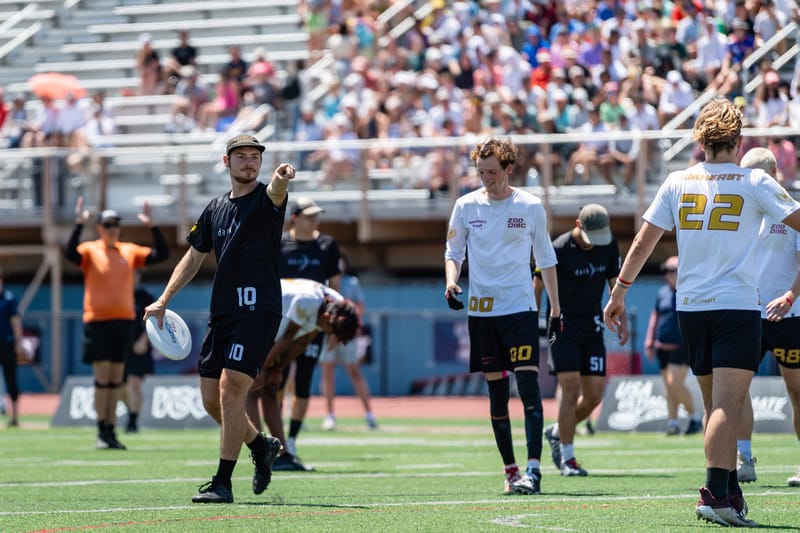
North Carolina Darkside
UNC Darkside have not left Nationals without a trophy since 2019, but “the number of trophies on the wall doesn’t really give you an extra point to start off your first game of pool play,” as captain Kevin Pignone astutely pointed out. This year’s Darkside team is still brimming with talent and aiming for a title, but it’s a bit different than past seasons’ iterations of this decade’s dominant program.
First, the stars are still around. Dylan Hawkins is still a dominant lane presence and an underrated defender. Matthew McKnight is a singularly talented space thrower. The amount of defenders who can limit Ben Dameron’s downfield impact continues to dwindle. But this version of Darkside also relies on Grayson Trowbridge and Sam Redinbo to bring pressure to opposing handlers. It also features Henry Chen as a big-frame matchup defender. Max Goetz plugs in admirably to the O-line as a fill cutter with a well-developed sense of timing. The list could go on as Darkside’s cadre of coaches develops talent to succeed in specific roles as well as any in the country.
The team is also quite versatile. After spending last season primarily in backfield roles, Callahan nominee Rutledge Smith has been unleashed downfield. “I spent a lot of my time in club this past season on [Raleigh] Ring [of Fire] kind of being the beta reset, but very much being allowed to push downfield and go cut a lot,” Smith said. “So I found myself downfield a lot. And I definitely gained some comfort doing that, kind of inserting myself in winning fill cuts and generally contributing to spacing and doing that.
And I felt really comfortable doing that. And I felt really fast.”
That success and that feeling translates into the college division. Meanwhile, Josh Singleton, relying on his experience handling in his youth ultimate days, filled in Smith’s backfield spot. With another layer of dynamism, stopping Darkside is harder to gameplan for than ever.
Four teams will be doing their best to stop Darkside on Friday and Saturday, but Darkside are not phased by the high talent level in what some people are calling this year’s Pool of Death. “I’m excited for our pool,” Singleton said. “I think over the past couple weeks when we’ve been thinking about the pools, I think that it’s natural to ask, ‘where do we want to end up? What pool do we want to have? Who do we want to see?’ But I think ultimately, you have to beat the best teams to win.”
That hasn’t been a problem for UNC in the past. Riding a historic tournament winning streak, Darkside won’t let the pressure of the moment get to them either. “In the past it’s been a repeat or a three-peat,” Singleton said. “It’s fun to say after the fact. I found myself celebrating that after it happened. But in the moment, honestly, it really is not that close to the forefront of my mind. I think it’s hard enough to win the one in front of you. There’s pressure to win the game that we’re in right then. And honestly, that kind of is enough.”
 Brown Brownian Motion
Brown Brownian Motion
After a heartbreaking universe point loss against eventual champions UNC in quarters last year – a result that caused many pundits to crown them unofficial second-best status in 2023 – #7 Brown Brownian Motion have revenge on their minds. They won’t have to wait for elimination rounds for an opportunity.
“I smiled a little bit when I saw UNC was in our pool,” said Oscar Low.
Can they capitalize on it and score a big upset? Can they win Nationals? The answer to that depends on how you view this year’s results. Their 10 losses are by far the most of any of the tournament’s top eight seeds. The regular season tournament finishes started well with a trip to the Florida Warm Up final – and then slid backward to seventh- and eighth-place finishes at Smoky Mountain Invite and Easterns. That trajectory doesn’t inspire confidence.
But if there’s one thing Brown is able to do under coach Jake Smart, it’s pace themselves for the postseason. “I’ve seen this team through many iterations,” said Elliott Rosenberg. “And notably the 2020 iteration that was certainly going to win Nationals if not for Covid was floundering at the Smoky Mountain Invite… I’ve seen these championship-level teams from those mid-season moments, and I think the biggest thing is to maintain effort through every point, even if we’re not putting folks necessarily in the best position to succeed on the field. We’re giving people some new directives, new setwork, we’re training folks to be more adaptable in different moments. And that comes with the caveat that we don’t really get some of the results that the other teams get early in the season. But we’re learning… and by April, May, we’re fine tuning at that point.”
And voila – right on schedule, they earned a comfortable win over heavy favorites #3 UMass Zoodisc to win the New England Region. That’s a statement result if there ever was one.
The talent backs it up – there was never any question about that. B-Mo have one of the best players in the division in Jacques Nissen to soak up approximately a million touches and sprinkle dimes across the field like it’s a gigantic jukebox. If fully healthy – which, to be fair, is at this point an unanswered question – Leo Gordon is essentially his equal. Flanking them are a collection of specialists who play their roles to perfection: Rosenberg as the ever-available reset and dominator savant, Henry Egan as the physical finisher, Jason Tapper as the lane cutting monster.
As for the defense, it’s possible B-Mo have a game-breaking force to serve as Nissen’s counterpart: Cam Curney, who returned to the team this season after a year away from the sport. As a rookie in 2022, he alternated between serving as the division’s rangiest deep-deep in zone looks and Brown’s best matchup answer for players like Henry Ing and Liam Searles-Bohs. If Curney comes close to that performance this year, Cal Nightingale and the rest of the D-line (with some crossover appearances from Nissen) should have plenty of opportunities to punch an extra break or two – which might just turn the tide against UNC.
Yes, there are some roster question marks – the health of Gordon and Eli Chang, whether the rumored return of 2023 rookie defensive standout Emmett Young is true.1 Regardless, here’s the takeaway: Brown is absolutely in the hunt for a championship.
 Texas TUFF
Texas TUFF
First of all, if you’re filling out your Nationals picks, there are few surer bets in the game than picking TUFF to make the bracket. They’ve accomplished that feat every time they’ve qualified for the tournament going back to the redraw, including in each of the last five seasons. That kind of consistency is remarkable. How do they do it year after year?
“Texas [in the past] has done a really good job of establishing a certain culture of having fun and hard work. Everyone really buys into that program and into that culture. It has carried on through the years because of the big alumni community – and it’s all connected in a way so that the new guys who come in buy in as well,” said Gavin Babbitt.
The talent helps, too, of course. TUFF have loads of it. Kolbe Bauer, Jake Worthington, Saaketh Palchuru, Aaron Barcio, Xavier Fuzat, Babbitt, and Cade White have all worked through multiple Nationals cycles making huge plays in crucial moments. Sophomore Owen Smith (offense) and sixth-year Alex Janelle (defense) stepped up in enormous ways this season to add to that firepower. They’re stacked. Is it enough to push them into Sunday play?
That largely depends on what kind of a game star fifth-year John Clyde has. At his best, he’s the team’s most important player. He excelled for years on the D-line – he’s both an elite deep defender and an elite puller – before switching over to offense this season to take on center handling duties. Between his choice of favorite targets (Worthington, Smith, Fuzat) and his pinpoint forehands and hammers, Clyde has everything he needs to throw Texas straight into quarterfinals.
Every shooter has off days, though, and Texas has not always found a way to recover when Plan A isn’t working out. That’s what bit them in a dreadful multi-point skid against Georgia back at Florida Warm Up, and then again for much of a forgettable weekend at Smoky Mountain Invite. The potential pitfalls with this team are as real as the top-tier talent, especially with two dangerous competitors lurking behind them.
How will they push through? Legs on the D-line are a big part of keeping the floor for Texas high, regardless of whether the ceiling is raised to its utmost for any given contest.
“It comes from a certain scrappiness our D-line has,” said Babbitt. “We really just like to run. A lot. And we use that to our advantage. A lot of other [teams’] offenses like to take shots that they don’t have, and it gives us a better chance to play hard on the other side of the ball.”
 Alabama-Huntsville Nightmares
Alabama-Huntsville Nightmares
The fourth seed in this pool, Alabama-Huntsville is the clear fan favorite among Nationals teams this season. The former D-III program showed up in 2024 with bracket runs at Florida Warm Up and Queen City Tune Up. Wins over BYU, NC State, and UNC Charlotte along the way earned the Nightmares a trip to Easterns without needing to attend the qualifying tournament.
Once there, they took down Nationals teams like Cal Poly SLO, Penn State, and Michigan with their high-flying, energetic play. Lest you think UAH simply chucks up hucks to athletes like Isaiah Mason, Michael Poe, and Kenni Taylor, the Nightmares do actually have a sound offensive philosophy.
“[Our] play is decision based,” coach Alejandro Guerrero said. “Making good decisions is the priority, and also not being afraid of the challenging things. We like to play big, but we like to do that with good decisions and good movement.”
Taylor, Bradley Fleming, and Chris Youngblood are some of the best possession handlers in the division. While Mason, Poe, and Jonathan Sillivant see a lot of time on highlight reels for their proclivity at pulling flying discs out of the air before others can, UAH is equally adept at keeping the disc moving and finding the next right throw to make, even if it’s not a huck.
Over the course of a fun-filled season, fans got to know Poe’s unlikely skies, Taylor’s give-and-go abilities, and Sillivant’s positioning in the deep space. Players up and down the roster in less camera-facing roles also shined. Conner Lough has an endless motor and a nose for the disc. Colby Bong plays bigger than his frame might indicate. Josh Kolby’s mark is an important part of the UAH zone defense. Callahan Diercks has improved his ability to generate pressure on defense.
The Nightmares’ star players generally get to showcase their two-way ability by playing an above-average amount of points. Seeing other players step up and succeed in their roles allows those stars to get the rest needed to play their best. Guerrero admitted it’s a “challenge trying to sparse out the legs–getting everyone ample rest at the right time at the right moment.”
In a stacked pool, UAH will need every bit of energy they can muster up and down the roster. Though it’s the team’s first time at D-I Nationals, they aren’t bowing down to the teams who have been here before.
“The goal is to win,” Guerrero said. “I told them at the beginning of the season that anyone who goes to Nationals has the ability to win. The margin of error is really slim, but anything can happen.”
 Oregon State Beavers
Oregon State Beavers
For the first time since 2017 and just the second time in program history, #13 Oregon State Beavers qualified for Nationals.
“We were so freakin’ stoked,” said Ben Thoennes. “People were just tackling each other… This team has lost four games-to-go in the previous two years. And getting to lose the fifth and then win the sixth was super-big.2 So much good energy after that.”
It’s worth taking a look at how they reached this point. We’ll start with the most recent feat, staying ahead of a tumultuous field at Northwest Regionals to take the region’s second bid. In spite of what appeared in advance to be a gargantuan challenge, they didn’t actually leave much doubt about the outcome. In fact, they were much closer to knocking off #5 Oregon Ego than they were to dropping the game-to-go against #21 UBC Thunderbirds.
Should we have been surprised? Probably not. The truth of the matter is, despite their entire roster’s lack of College Championships experience, they played at a Nationals level all year. The Beavers simply lined up a path to a bid, walked it, and secured the bag.
“Going into this season – we lost a couple of players, but we gained so much depth from incoming freshmen, and it really just filled out our roster,” said Lucas Henry. “Every year I’ve been on the team, going to Nationals has been our goal. But this year it felt a little more real to me.”
Benefitting from the same youth pipeline that’s been nourishing Oregon, the Beavers at long last boast a steady stream of talent that can match up against the country’s best consistently. They also have strong connections with a couple of elite club programs: Portland Rhino Slam! and Eugene Dark Star. They’re in a great spot, nestled between the source material and its final enrichment.
The upshot is a pair of ace line leaders (Felix Moren on defense, Ben Thoennes on offense) and a frequently brilliant supporting cast. The O-line do not shy away from the long ball. And why should they, when they have two of the best young receivers in the division in Henry Wayte and Leo Renzema to bring down Thoennes’ missiles? The fearless attitude paid dividends this spring, and will continue to pay dividends this weekend.
“I absolutely love throwing to anyone,” said Thoennes. “But when those two bail me out on stupid throws or get open by crazy margins – I think the other throwers on this team will agree – they just make it really, really easy to play ultimate.”
As good as they are, though, Oregon State could be in for a bumpy weekend. They have not played any of the teams in their pool yet this season. Three of their opponents can lean on a massive reserve of invaluable Nationals experience, and the fourth (UAH) scored much bigger wins than the Beavers over the course of the season. And that’s alright. This team is young enough that a tough weekend could motivate their young roster to reach even greater heights next time around. They’re primed to make a return trip or two in the near future.
Of course, these Beavers are also good enough to catch lightning in a bottle, stun a couple of favorites, and gnaw their way into the bracket.
“All through the [Northwest regional final against Oregon] we were right there, and that really let us know we can challenge these top teams at the highest level,” said Forrest Vargyas.
Pool B
Teams: No.2 Georgia, No.7 Oregon, No.11 Carleton, No.14 NC State, No.18 WashU
Overall Strength: 💪💪💪
Star Power: ⭐⭐⭐
Upset Alert: 🚨🚨
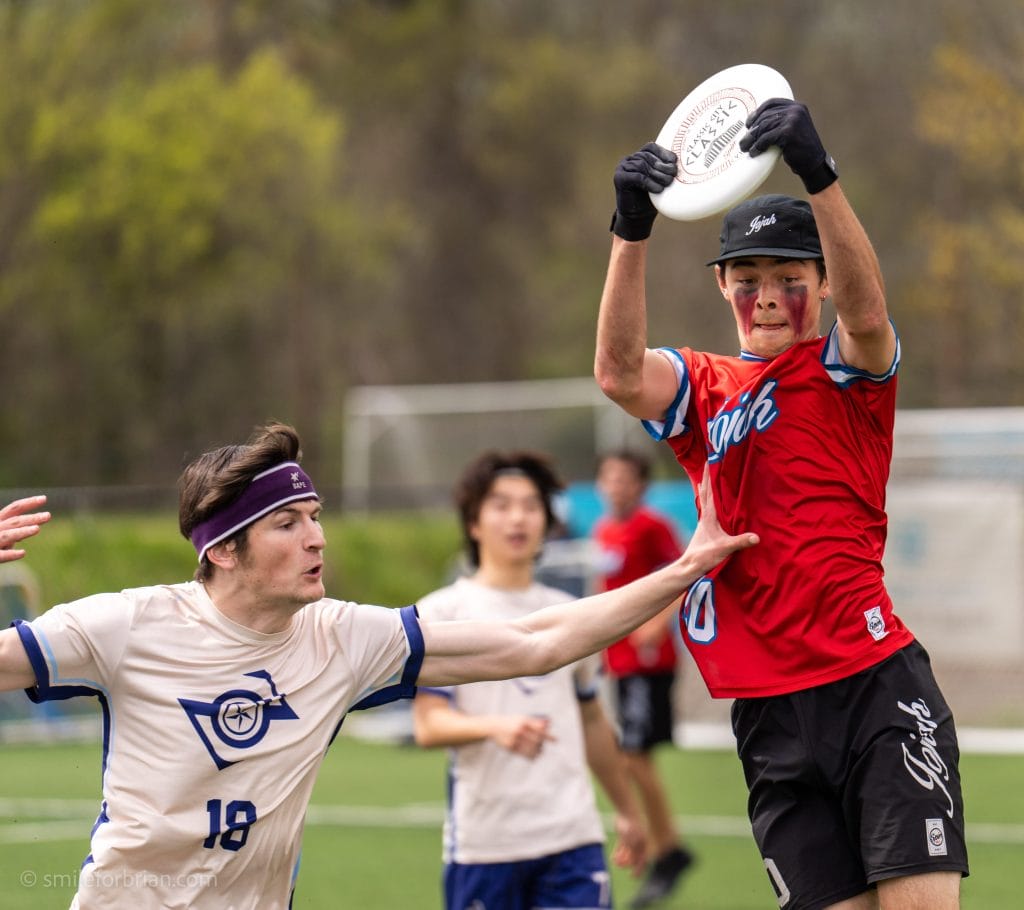
 Georgia Jojah
Georgia Jojah
Since their tournament win back at Florida Warm Up, Georgia Jojah has the continent on alert that they are the team to beat this season. The young up-and-comers from Jojah’s 2021 trip to the national final are now fully fledged leaders on a team with championship aspirations and title talent. Georgia followed up their Warm Up win with finals appearances at Smoky Mountain Invite and Easterns, splitting those results with a strong UMass team.
“Winning Easterns honestly was something I was super proud of,” Georgia captain Cole Chanler said. “That’s a very high level tournament. A lot of national level teams there, and just being able to win that – considering Jojah has never done that, let alone won many regular season tournaments in the past decade – that was great for us.”
Aside from the tally in the win column, the way Georgia is winning is what’s most impressive. It isn’t one particular facet of the game Georgia crushes opponents with, it’s the increasingly high talent across the board that simply doesn’t let an opponent rest on either side of the disc.
“This team has done a really good job of becoming increasingly more fluid as the season’s gone on,” Jack Stephenson said. “We started off with an O- line and a D-line and we were kind of putting people into different places. But then as the season’s gone on, I think that’s become a lot more interchangeable. And a lot of the guys are going both ways and are able to play with any grouping of players, which I think has really given us a lot of success.”
It hasn’t all been easy. Stephenson and Chanler missed a connection in an early season Florida Warm Up game against Carleton that led to CUT scoring the game-winning callahan. Georgia went on to win that tournament despite the loss.
“Taking that loss, but then just kind of looking at each other and knowing that we had to respond and we’re going to be able to respond,” Stephenson narrated, “and then the team actually backing it up and doing it in bracket play, I think was a really, really sweet moment for the team. For us as well to be able to win that tournament after facing a little pushback and being down as a team at one point.”
Even within games, Jojah’s most impressive moments were comebacks. The team found themselves down 8-5 against Cal Poly SLO in the semifinal round of Easterns and came back to win that whole tournament, too. “We’ve also just won some big moments,” Stephenson continued. “We’ve had a few games where we went down at halftime. And those are games that past years’ versions of Jojah might have let slip by. But this year we were able to come back and show that we can make those changes and have those big games, which I think is really, really important for us as well.”
Whether through their dominating play, goofy sideline energy, or reliance on past success, Georgia is confident they’ll find a way to succeed this weekend. After the powerful regular season the team completed, anything short of a deep bracket run will be a big surprise.
 Oregon Ego
Oregon Ego
Raise your hand if you thought Mica Glass was too young to lead #5 Oregon Ego’s offense – and, often, its defense – to a spring season that at least matches what the 2023 version accomplished at this juncture.3 The doubters were wrong. The 2023 Rookie of the Year took on everything a star player could be asked to and more.
The secret key, though, is that Glass hasn’t been doing it alone. In 2023 he was only the most prominent member of what has turned out to be a stunning incoming class: Ben Horrisberger, Aaron Kaplan, Adam Wulkan, Marcus Beidler, and Max Massey have been some of the best players in their second years with the team. They are at once growing as players and setting a tone for the program in a way that’s immediately eased the transition away from last season’s graduates.
“There has been no question about their leadership and commitment since the day they got here. Yes, they’ve stepped into leadership roles. But they’ve really been leaders with their voices, by example, on the field since day one,” said captain Chander Boyd-Fliegel. “So it really hasn’t felt very different this year.”
The shining moment for Ego this season came in the second of their two tournament wins when at Northwest Challenge, after having lost three consecutive games against #6 Cal Poly SLO SLOCORE to start the year, they found a new level of effort on defense and unlocked a little bit of extra confidence on offense. The 15-12 win was an immediate confidence builder, proving to the team they belong among the division’s heavy hitters. “What makes us unique, one of our biggest strengths, is our defensive intensity and depth,” said Chander Boyd-Fliegel.
The way Horrisberger, Keali McCarter, Gabe Nobis, Julian Saunt, and others have begun to key in on the disc, it’s hard to argue with Boyd-Fliegel’s assessment. But it’s far from their only asset. The team’s shooters all developed quick releases from motion and an eye for Ego’s trio of towering receivers: Boyd-Fliegel, McCarter, and Adam McNichols. It looks like a recipe that could produce a championship.
It does come with one caveat, however. “There’s still that question of what it’s going to look like when we play those East Coast teams we haven’t had a chance to play yet,” said Boyd-Fliegel.
Ego did not make their customary trip to Easterns this spring. That means they didn’t get to test their mettle against any of #1 Georgia Jojah, #2 Pittsburgh En Sabah Nur, #3 UNC Darkside, or #4 UMass Zoodisc. Even with plenty of tape, those matchups are informational dead zones. Until their appointment with Jojah, that is. Then we’ll all see exactly how high Ego’s ceiling goes.
 Carleton CUT
Carleton CUT
“One of the first things I said on the first day of tryouts was that our ultimate goal is to not just be at Nationals, but to go and win it,” CUT captain Leo Jordan said. “That was something that everyone trying out for CUT, everyone on the team heard literally the first day.” Through an up-and-down season, CUT displayed the kind of talent and tenacity needed to follow through on that goal; the question will be if they can play consistently enough to accomplish it.
In Declan Miller, Cullen Baker, and Fin Fuhrmann, Carleton has a smooth backfield operation on offense. Daniel Chen and Tej Murthy alternate as the 1 and 1A options and each have found their way onto their fair share of highlight reels. “Our offense in its ideal form shows that everyone there can touch the disc and is very capable of throwing upfield throws and throwing hucks and having hucks thrown to them,” Jordan said. “If we’re spreading the ball around, we’re in a really good spot and playing with pace.”
On defense, everything starts with a Leo Xiao pull. His towering blades caused a number of short field turnovers already this season; with wind and rain in the forecast for Nationals, they’ll be a big weapon for a CUT D-line that turned over many of its major contributors from last season. “We’ve talked about being strong at applying pressure,” Jordan added. “A lot of our guys are smart and know how to orbit and play good positional defense. But something we’ve been just talking about is just, ‘go, go get the disc, go make a play.’ It’s something that those seniors were really strong at last season and it’s something that we’ve just been repping.”
In wins over Georgia and UMass, CUT’s defensive pressure and intensity matched the team’s offensive beauty and poise. In those games, CUT looked ready to push towards their goal of winning another national championship. In losses to Colorado, Vermont, and SLO, the level of execution needed simply was not there. Which version of CUT will show up at Nationals? The one that can win a championship this year? Or the one that might be a favorite in another year or two?
 NC State Alpha
NC State Alpha
Since their first Nationals appearance of the modern era in 2019, NC State have turned over their entire roster and remained a Nationals level team. They’ve officially reached program status and are looking not just to survive at this level but to improve upon their winless appearance at last year’s tournament. With wins already over Nationals teams like Penn State, Michigan, and Minnesota (twice!), Alpha already proved they have what it takes to accomplish that improvement.
With losses in recent seasons of high level talent like Dylan Hawkins and Justin-Cooper Williams, the team had to adjust its past strategies to the current team. “We had to figure out how to maximize and create systems that maximize those players rather than asking talent to win us games,” coach Michael Lee said. Taking inspiration from Washington DC Truck Stop teams of recent club seasons, Alpha designed an offensive system intended to help every player do the thing they do best. With budding talent like Callahan Award finalist Suhas Madiraju, Daniel Ferriter, Sean Wiles, and Zac Kuelz trotting out for most O-points, the Alphia coaching staff created a recipe for success.
“Rowan McDonnell had a quote after Truck won about how Truck’s offense was really good because it just asked all the O-line players to do the thing that they were really good at over and over again,” Lee said. “For me, this O-line looks a lot like that. It’s just people doing what they’re supposed to be doing and what they’re really good at doing and they don’t really feel overextended.”
Essentially, the goal is for Matti Lee, Madiraju, and Ferriter to move the disc to an advantageous spot to take a deep shot for Kuelz or Wiles. Easier said than done, but it’s also easier than trying to force players into a system that does not accentuate their strengths.
On the defensive side, players like Henri Lessard and Andrew Schultz are known as lockdown defenders and are also becoming plus cutters on the counterattack. The D-line offense has been a work in progress all season, but is rounding into form at just the right time. A 15-5 romp of UNC Charlotte in the game-to-go required a lot of breaks!
On both lines, the offense became more dynamic over the course of the season. “The moments where we struggle are just when we forget that we can cut deep and throw real effective deep shots,” coach Trevor Lynch added. “We really try to work in small space when a team is trying to take that away when we need to just be a little bit more cognizant of how teams are trying to play us and then countering that rather than trying to force one way of how we try to play.”
If Alpha are able to find the right energy to play the game the way they want to play, they’ll easily eclipse their zero win total from last season’s Nationals and have the potential to push up and into the bracket.
 Washington University Contra
Washington University Contra
All season long, #18 WashU Contra were motivated by a single, obsessive thought: the game of musical chairs at 2023 South Central Regionals that left them shy of the National Championships.
“The end of that ‘23 season was pretty bittersweet. Two points out… After beating Texas on Saturday, losing to them by two points on Sunday,” said Seth Fisher-Olvera. “We knew we were right there. So basically at that point we decided to do what we had to do to earn three bids [this year]… We didn’t want to leave a shadow of a doubt about what the outcome of our season would be.”
The 2023 disappointment determined their 2024 tournament calendar – they flew to both Florida Warm Up in February and Stanford Invite in March in pursuit of valuable strength of schedule ratings. And it motivated them to squeeze every possible point out of every game, whether that meant scrapping for dear life in close matches against Pittsburgh and #12 Vermont Chill or carefully managing big margins against a non-Nationals field4 to ensure their bottom line remained in the black.
In the end, they checked every box en route to the final strength bid. Now what?
For starters, Contra are going to put up a lot of points. Between Noah Stovitz and Cam Freeman they have two of the college game’s most reliably amazing offensive talents. It’s not inconceivable they’ll end up among the tournament’s scoring leaders. (“We have a rotating cast of human sacrifices that we throw at those two guys [in scrimmage],” said Fisher-Olvera.) And the talent is deep enough – watch out for Chris Heron doing his best Stovitz impression – that, as they discovered at Florida Warm Up when they didn’t have a full roster, they were able to unlock some extra flexibility.
“One of the biggest things was that we could throw someone new onto our O-line,” said former offensive mainstay Nic Sprague. “And they were so good that they took my spot on the O-line and allowed me to move over to the D-line.” He joins two pesky burrs of matchup defenders in Fisher-Olvera and Ethan Zhang, as well as the bazooka-armed Joel Brown, one of WashU’s regular crossovers to the offense, to help lead the team for breaks.
WashU has a tall task ahead to reach the bracket though, and they know it. They’ll probably need to upset at least one of Georgia, Oregon, or Carleton to advance beyond pool play. The good news is they know they can trade blows with those higher-ranked teams.
“Something that we said as a team when we played against Oregon at Stanford Invite was, ‘Oh, these guys are good.’ But at the same time… we had just come off a universe point win and were low on legs, and especially in the first half we could hang right there with them. It wasn’t like these teams are untouchable,” said Sprague.
To do it, they’ll need to fall back onto the same preparation and determination that got them this far in the first place. And something else, too: the sense of pride that comes with accomplishment. “The goal of earning that bid… It was just filler, the same way that the goal of beating Texas was last year. It was more like…’We’re going to put out something that we’re going to be proud of.at the end of the year,’” said Elie Weitzman. “And I think that sense of pride in our work is what sets this Contra team apart this year.
Pool C
Teams: No.3 UMass, No.6 Pittsburgh, No.10 Minnesota, No.15 California, No.19 Ottawa
Overall Strength: 💪💪💪💪
Star Power: ⭐⭐
Upset Alert: 🚨🚨🚨
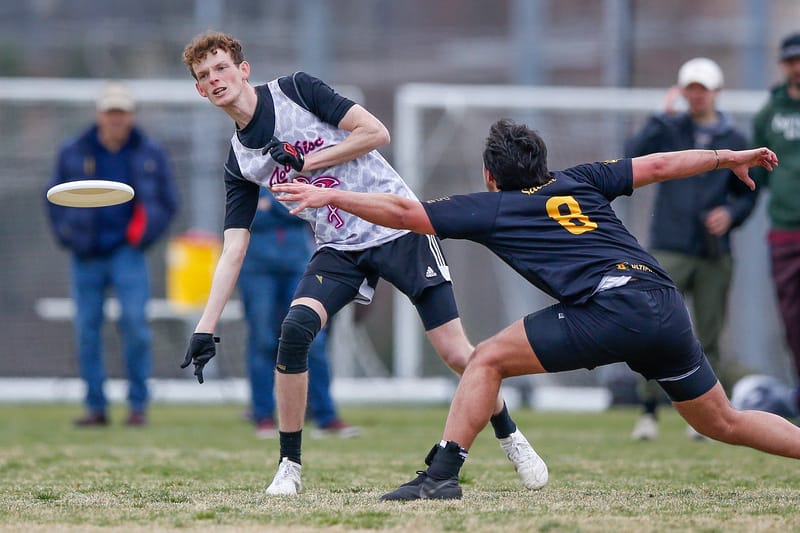
 Massachusetts Zoodisc
Massachusetts Zoodisc
Starting with the obvious: #4 UMass Zoodisc have what it takes to win Nationals this year. They returned most of the roster that took them to the final in 2023 – and they brought forward a lesson from the 15-12 defeat there at the hands of #3 UNC Darkside.
“Don’t ever just be happy to be there,” said Isaac Kaplan. “That was the biggest lesson from the UNC game. We kind of had accomplished our goals in a way. To make that game was like, ‘Okay. We did it.’ And there was still a lot more to do. I think we were very capable of that, but we didn’t approach it in the same way of, like, ‘We need to take this game in the same way we need to take every other game.’”
How will they make a similar push in 2024 to give themselves a chance? Largely with the same kind of approach that led to their success last season. Step one, foster a healthy mix of humility and confidence to guide expectations. This duality of the Zoodisc mindset is apparent in the way their captains responded to nearly being upset by Texas in a 2023 universe point quarterfinal thriller:
“Everything is really unpredictable and hard and not guaranteed,” said Luca Harwood. “You can’t take anything for granted there.”
“If you believe that it’s going to happen, and you do everything to follow through on that belief… usually it does happen,” said Isaac Kaplan.
Next, lean on world-class talent. The conversation usually starts with the electric Wyatt Kellman – but then it just doesn’t end. Harwood, Caelan McSweeney, Noel Sierra, Gavin Abrahamsson, Tobias Paperno, Griffin Yas, Jae Lee, Kaplan, Artie Aucoin, Leo Narbonne, Sam Green… all of them would be kill-line players at nearly every other school in the country. They have so much talent they’re still title contenders without either the 2022 Rookie of the Year or 2023 Breakout Player of the Year – our awards that deliberately put a spotlight on players who are likely to drive a team’s future.
That long list gets at the third side of Zoodisc’s triangle of success: a genuine commitment to playing through their entire roster. It means they can win while missing personnel, as they have done for much of the year as Kellman, Harwood, Paperno, and Narbonne dealt with injuries. “When people are missing because of injuries, I don’t think it really affects us very much,” said Noel Sierra. “There’s something powerful about missing one person and the team being able to succeed. It’s kind of weird when you sub off and it feels like nothing’s changed. But that’s kind of what makes a really good team.”
The upshot is they gave more high-level reps to their outstanding rookie class (Ethan Lieman, Taylor Hanson, Ethan Schiff) than they might have otherwise, and they’ll be stronger for it.
Optimism is warranted. So are some small concerns, of course. While UMass toppled #1 Georgia Jojah to win Smoky Mountain Invite, Jojah have the winning record so far in the teams’ three games, and they showed an ability to match both Zoodisc’s talent and their legs. Their 15-11 loss to Brown in the New England final is slightly more worrying. Then again, they suffered the same fate at Regionals last year and hardly missed a beat come Nationals.
The field of competitors is strong, and, as Harwood emphasized, there are no guarantees. All in all, though, the odds of Zoodisc playing on Memorial Day again – and getting to apply what they learned a year ago – are extremely favorable.
 Pittsburgh En Sabah Nur
Pittsburgh En Sabah Nur
Pittsburgh made waves this season with their monumental upset of UNC in the quarterfinal of Easterns. It was not so much that they notched the win, but that they didn’t just rely on Henry Ing, Scott Heyman, and Tristan Yarter to score all of their points. Sure, those three had and will have a big hand in the team’s success this year, but this is the deepest team Pitt has fielded in years and their ability to trust players all over the roster lengthened their title window.
Reid Duncan, Maxwell Olesen, Morey Averill, Will McGlynn, and Roger Zeng are all experiencing simultaneous breakout seasons. Zeng’s ability to find holes even in the tightest defenses helped Pitt punch in numerous scores this season. Duncan’s growth as a defender allows Ing, Yarter, and Heyman to spend more D-points on the sidelines keeping their energy fresh for offense, as the team has another stopper to rely on. McGlynn adds another intelligent disc mover to the backfield, taking some of the pressure off shooters like Aiden Landis to do too much heavy lifting.
“I think all those players were strong players for us last year and previous seasons,” Yarter said. “They’re on the team and had the capability and potential to play up to how they played this year. There were just other players filling some of those roles, you know? They just had a small role in previous years and they stepped up after other players graduated. I also think part of that is on our coaching staff particularly, and also our player leadership, just doing an amazing job developing players as they always have.”
The balance of this Pitt team is as impressive as their results. Their recruitment also landed Micah Davis, a key member of the O-line who stepped into a high profile throwing role this season and threw his way right into the Rookie of the Year conversation. One X-factor: After an untimely injury ended his Nationals early last season, Peter Kotz is playing again and finding his rhythm as a core member of the offense.
“Maybe I’m not physically exactly like I was before,” Kotz said, “but I’m just trying to support the guys on O-line. We’ve got some big names, we’ve got Scott, Henry, Tristan. So I’m just trying to take whatever load off their shoulders that I can, try and make their lives just a little bit easier.” With yet another dangerous cutter to keep track of, opposing defenses are going to have a hard time slowing down a Pitt team that loves to huck to Heyman, who might be the fastest player in the division, but can also play small ball between Ing, Yarter, and Zeng with the best of them.
Pitt already found a lot of success this season, and they have another level of potential to unlock. With the depth evident on this team, it isn’t outrageous to think of them as a legitimate title contender.
 Minnesota Grey Duck
Minnesota Grey Duck
They say it’s best to peak late in the spring, and Minnesota’s dominant 15-10 win over CUT to win the North Central region points to a team who is growing consistently and peaking at the right time. “Those games against Carleton are always going to be really heated, really high energy, high intensity,” captain and Callahan finalist Paul Krenik said. “I think something that we did really well was we went into that game just ready to fight for every last point. We went into it knowing that it was going to be a dogfight. And I think that we played accordingly, which was definitely one of the coolest games that we’ve played this entire season.”
This season has been one of redemption for a Grey Duck team that brought back many contributors from a disappointing early exit last season. “I think we knew after last year when we lost in pool play, we knew we had a lot of guys coming back,” team captain Ian McCosky said. “I think we brought everyone but one or two guys back from last year. So we knew coming in, we had a lot of depth and we had a lot of experience to make a deeper run. And I think that was the goal in mind the entire time was, you know, not only getting to Nationals, but doing it confidently and then making it our goal to get past pool play. And then once you do that, it’s anyone’s game”
Minnesota always had the offensive talent to succeed. Putting together Krenik, McCosky, Anthony Jirele, Sebastian Brauer, and Kenji Her is going to lead to good offense no matter the system they employ. Add in some growth from Austin Gin and once again offense is nothing to worry about. What has been impressive from Minnesota this season is that their defense is up to the task as well.
“More specifically for the D-line,” D-line standout and captain Levi Dohman said, “It’s a lot of communication improvements. Just gaining chemistry with our teammates was one thing that we seemed to be lacking a little bit towards the middle of the season, but we were able to all get on the same page, improve that chemistry, have better communication on the field.I think that’s really helped us a lot.”
With the potential for success not seen since the team’s championship in 2016, Grey Duck are not getting ahead of themselves. With the bitter taste of last season still in their memory, the team is focused on enjoying every minute of their time at Nationals and making the most of their time together.“Every game of Nationals is the hardest game you’ve ever played,” Krenik said.
“Every single game can be a universe point thriller or a complete dogfight to the end,” Krenik continued. “That’s something that Levi’s been saying that’s been really resonating with the team the whole year is just focusing on a singular moment and don’t think about anything else that’s going on. I don’t care what happens in the future or the past.”
 California Ursa Major
California Ursa Major
Death. Taxes. Dexter Clyburn getting open. The CalZone shutting doors. These are just a few of life’s realities, and at least two of them helped Cal make it back to Nationals once again. With an emerging star, a talented cadre of players itching to make an impact, and an underrated coach/strategist who puts his teams in position to succeed, Cal has all of the ingredients to surprise doubters and delight fans at Nationals.
“Coming in, we had pretty lofty goals,” captain Emery Goulet said. “We were returning a good amount of guys, a good amount of key players from last year. And so I think we wanted to continue that momentum from Nationals the past couple of years and go into this year headstrong.
“We wanted to be a Nationals caliber team. We’ve checked that box,” Goulet continued. “I think we wanted to go far in Nationals, make the bracket and all that kind of stuff, which is still definitely attainable. We’ve put ourselves in position to do that. I think we have achieved to an extent what we want, but we’re still hungry for more. And we want to go get after it at Nationals for sure.”
It would have been easy to write off Cal after Gavin May, last season’s primary goal scorer, injured his knee and was ruled out for the rest of the season back in March. Instead, the team found ways to highlight other players’ gifts and continue to succeed. “For him to go down like the second point of SMI, one of the biggest tournaments of the year for us, that was obviously tough to see,” Goulet said. “But I think it’s just kind of been a next man up mentality. I haven’t really seen a dip in the team’s overall mental state and focus.”
Carter Lankford and Dylan Pearson have become the go-to big receivers on offense. Vincent Su’s growth allows him to dance around dominator sets with Clyburn and Ridge Huang. Samuel Laur (D-line point guard), Robert McCabe (intelligent goal scorer), Camden Mah (defensive marking), and Evan Kandell (quick disc movement) all find their places to contribute, and the team’s collective trust in their depth opened new strategic doors. No longer just reliant on a zone defense or a huck-and-hope-Gavin-will-catch-it offense, Cal flustered teams with their ability to switch between intense person defense and zone, or between big-field offense and dominator sets.
With a new sense of dynamic flow and a buzzing energy around the team, Cal is not a team that can be overlooked or dismissed as a gimmick. They’ve made the bracket each of the past two years and aren’t planning on slowing down any time soon.
 Ottawa Gee-Gees
Ottawa Gee-Gees
It’s an odd transition for a team playing in the Canadian University Ultimate Championships to to play in the USAU series, if for no other reason than the extreme change in timeline. Because of the weather, Canadian teams start practicing at the beginning of August for a national tournament in October. And then… that’s it. That’s the season, over before many US teams make up their rosters. To extend that season by an additional eight months is an enormous ask for a team. How did #24 Ottawa Gee-Gees go about getting the team on board?
“It’s been a goal of ours for the past couple of years. And we never had enough buy-in to make it happen. In the fall – that’s when [the Canadian] University Series is – we decided as leadership to say, ‘If you’re going to play for us [in the fall], you have to commit for the whole year. We’re going to go for it. We’re going to do this thing,’” said Maxime Ayad.
It worked. With minimal defections, the Gee-Gees’ rank-and-file agreed to keep practicing and set their sights on a second goal: taking the Metro East’s customary single bid to earn a trip to Wisconsin on Memorial Day Weekend. Once again, it worked – despite some logistical difficulties.
“We played [Conferences] with eight people,” said Ayad. “We had two people drive Saturday night to get to their exams Sunday morning in Ottawa. And then me and another guy drove Sunday morning at 5 a.m. to play one game so that we had enough people to field a team.”
Once they reached Regionals, they were confident. “We knew we were stronger,” said Logan Keillor, an assessment borne out by the Gee-Gees’ margins of victory. The final win against Cornell ended up at a whopping 15-7.
“Honestly, I don’t think I realized we were ahead by that much…It’s been so much fun playing [the American teams] because they stay so intense and so into the game through the entire game that you don’t even realize what the score is,” said Keillor. “So when we caught that final goal I don’t think I even realized at first that it was the final point. And then kind of walking around afterwards and realizing it was done was surreal. I didn’t know how to feel, really. Nothing we’ve done will ever compare to this American Nationals tournament.”
How they’ll fare in Madison this weekend is anyone’s guess. Ottawa enters the tournament as the least understood, least scouted team in the tournament. While it’s safe to say they probably aren’t title contenders, they have a wide range of potential outcomes that all feel at once assured and far-fetched. The top-end talent is certainly there. O-line dynamo Marty Gallant will represent Canada at WUC later this year, and both Ayad and Keillor are virtuoso defenders capable of leading an attack after the turn. They’ve had high-level club experience with Ottawa Phoenix.
Could they score an upset or two and instantly salvage the Metro East’s regional reputation by making the bracket? Don’t bet the farm on it or anything, but the answer is, legitimately, yes.
Pool D
Teams: No.4 Colorado, No.5 Cal Poly SLO, No.9 Vermont, No.16 Penn State, No.20 Michigan
Overall Strength: 💪💪💪
Star Power: ⭐⭐⭐⭐
Upset Alert: 🚨🚨🚨🚨🚨
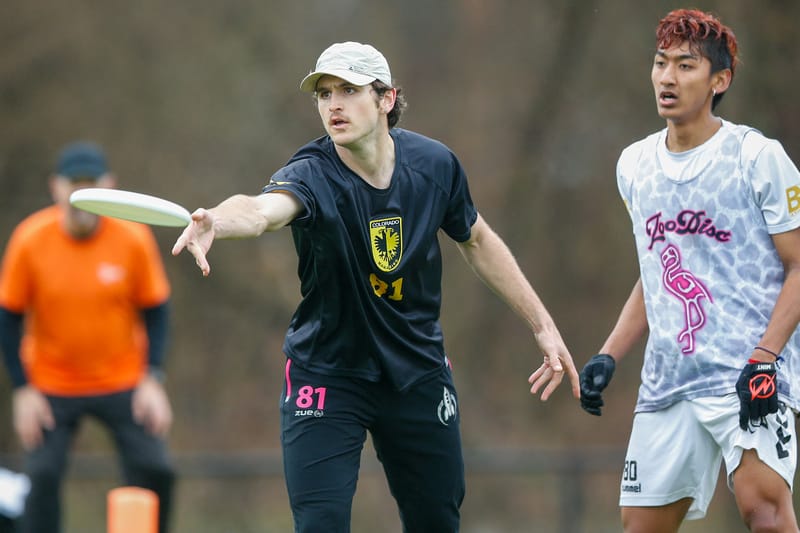
Colorado Mamabird
There’s a discrepancy in various assessments of #8 Colorado Mamabird. In USAU’s algorithm, they’re the top team in the country by a hair over #3 UNC Darkside. Our own staff power rankings have them at more of a quarterfinals level, down below a couple of teams with more losses on the season. And Nationals seeding? A rough average of the two at fourth overall. What’s the actual potential of this team amid all that conflicting data?
That kind of depends on how you view the sea change that occurred between last season and this one. “Even though we do share the patch,5 each team is inherently different,” said Nate Buchholz. That’s an understatement, to say the least. Between transitions away from last year’s key offensive players – Danny Landesman is out for the year with an injury and Calvin Stoughton moved over to the D-line – new roles for some of last year’s mainstays, and the incorporation of one of the most exciting rookies in the country in Tobias Brooks, it’s been a fresh start for a program that fell short of its goals with a 2023 prequarters exit.
“It’s definitely a different take on our O-line,” said Ryan Shigley. “We’re going to make you guard all seven of us.”
Shigley is one of the new pieces, stepping into a handling role alongside the more experienced Seth Wells, and looking more at home there with every game. They’ve got a trio of highly dynamic hybrid cutters in Nanda Min-Fink, Levi Tapper, and Brooks, and a prototypical finisher in Dexter Luecke. The fact that everyone on the line – except perhaps Luecke – can comfortably exchange roles at any moment makes them nimble.
The D-line have made hay on matchup coverage takeaways by Stoughton and sophomore stand-out Zeke Thoreson. The two of them are backed by at least a dozen more solid players, keeping everyone fresh.
There’s no doubt about the roster, then. Lingering questions have more to do with the inconsistent season – not quite on a par with the other three one-seeds, despite what the algorithm says. The scattered losses don’t appear to faze Colorado, though. “Just because some of those outcomes didn’t go our way, it doesn’t mean we didn’t get what we were looking for out of those games and out of those tournaments,” said Buchholz.
The proof was a gangbusters performance at South Central Regionals. Historically they match up evenly with perennial rivals #15 Texas TUFF. Not this year: Mamabird scored a knockout 15-9 win in the final.
“[The South Central win] means that we’re ready to fight, we’re ready to scrap,” said Max Van Sickle. “Against really good teams, we’re ready to come with everything we have.”
 Cal Poly SLO SLOCORE
Cal Poly SLO SLOCORE
I went to type the Cal Poly SLO preview and was a bit stunned that I couldn’t find the heading. How can you look at ‘CORE’s season and think it was worthy of anything other than a top seed at Nationals. Like last season, SLO will be operating out of the second row of pool placements and like last season, SLO has the talent, drive, and intelligence to win a championship.
It isn’t just that SLO have an insanely high talent level. Calvin Brown, Anton Orme, Seamus Robinson, Alex Nelson, James Whealan, Max Gade, and Kyle Lew have all graced our awards conversations this season, but what stands out when watching SLO is the depth they’ve developed over the years. Joseph Thachet is the perfect example: A few years ago, he saw a handful of points at tournaments in games that weren’t close. He worked hard, steadily improved his throwing skill, developed a high game IQ, and was ready to fill in as a D-line hub handler when Carson Crouch went down late in the season with an injury. While Lew still pulls the strings on the counterattack, Thachet is more than just a puppet in the system. So many of these SLO starters can claim those kinds of development stories. Dodger Middlebrook, Keaton Orser, Wyatt Colburn, and Alex Yannelli have all improved and all bring something to the table.
SLO isn’t messing around this season. The team played a whopping 29 regular season games across four tournaments, traveling to Northwest Challenge and Easterns on back-to-back weekends to pit themselves against some of the best teams in the country. The win that stands out though? “At Pres Day, we were playing pretty well, winning that tournament,” coach Tim Gilligan said. “Getting to beat Colorado after we’ve lost to them the last few times we played them–that was definitely a high point.” SLO will have another chance to see Colorado in pool play, perhaps exacting revenge after Mamabird knocked them out the last time Nationals were in Wisconsin.
Of course that pool play game will get a lot of attention, but the SLO leadership has grander goals for their time in Madison. “A few things that I’ve really tried to instill this year is just not taking anything for granted,” Gilligan said. “The way that a college season, everyone’s college career, there’s an end date to it. And I guess that happens to your club career too. But I don’t know, just because it’s so clear how long you’re in college–for most kids, I should say–but every year just feels that much more special than even a club season. And so just wanting to continually say that we don’t take anything for granted. Every single second of the season counts.” SLO will try to make sure their season has more seconds in it than everyone else’s this weekend.
 Vermont Chill
Vermont Chill
The transition from 2023 to 2024 has been a monumental one for #12 Vermont Team Chill. Most of the architects of the program’s rise to Nationals-level graduated from the program, leaving the reins to a new set of leaders. That transition has been, at times, bumpy. Look no further than the team’s rollercoaster run through New England Regionals to take the last slot in Madison, losing to both #23 McGill MUT and Northeastern Huskies on Saturday before avenging both losses in a no-margin-for-error backdoor bracket.
“It’s easy to kind of look ahead,” said Declan Kervick. “It’s something a lot of teams tell themselves they’re not going to do… but you have that break between [conferences] and regionals where … the whole way you’re thinking, ‘We wanna try to play these kinds of teams at Nationals, we’re excited to play Brown again, we’re excited to see UMass again…’ And you forget how good the other teams are in the New England region.”
To Vermont’s credit, they were able to right the ship before the damage to their season was critical. Kervick credits the sudden scare of not being able to play any more frisbee for helping the team kick it into gear. “That was our first taste of The End, I guess,” he said. “It always felt like a faraway thing, the season ending. And then on Saturday after losing those two games it felt like we could see the end of the tunnel.”
Senior Ben Payson gave an emotional speech in response to the lackluster performance. Clearly, the message resonated. “I’ve never seen our team come back the next day with as much fire and focus and effort,” said Kervick.
It’s good for the game that they did, too, because Chill are a worthy contender and a brilliantly fun watch. Whether CJ Kiepert is catapulting full-field hucks and letting his opponents know – vocally – when he gets a block on defense, Payson is clamping up a reset for eight counts, Zack Watson-Stevens is leaping over someone’s head like a porpoise breaching, Chase Drinkwater is flying fifty yards at a dead sprint to knock the disc away from the other team’s best cutter, or Kervick and Casey Thornton are warping time and space into new patterns while they execute a semi-unthinkable throw or catch, Chill are going to put on a show.
Provided they put to rest whatever demons plagued them on the first day of Regionals – which, to be clear, is still an open question – they’re every bit as likely as the higher-ranked Cal Poly and Colorado to take pool D and skate into quarters with a bye and, from there, possibly match last year’s brilliant semis campaign. Look out for high-variance performance, though, which has been the order of the season for this (so far) inconsistent iteration of Vermont.
 Penn State Spank
Penn State Spank
A mere 15 months ago, I wrote the following about Penn State Spank: “With nearly 40,000 undergraduates on their University Park campus, you’d think 28 of them would be good at ultimate.” Suffice to say, after years of misplaced hype, Penn State has not just found a bunch of very good ultimate players, but they’ve also built the kind of sustainable program that leads to lasting improvement and continual growth. “It’s just been a steady improvement process,” captain Alex Mullen said. “We’ve had some good recruiting classes the last couple of years, and then a lot of guys just bought in. And I feel like last spring was more the turning point, and then this year was just a continuation of the work, and it happened to pay off.”
“That year after COVID, we had like over 20 rookies and we had so much raw talent that just flooded in the program all at once,” Jeremy Long added. “And these past three years have just been polishing that talent. And now at this point we’ve all played together for three years and our core is just so strong and that’s really what has allowed us to make the push.”
With wins over other bubble teams like NC State, UNC Wilmington, Ohio State, and UNC Charlotte, Spank proved they belong in the Nationals conversation in 2024. Though they have yet to secure a signature win over a top team, their close games (two- or three-point losses) against the likes of UNC, Pitt, and Brown speak to their talent and their mindset that they are not afraid to challenge the top teams.
And all of the ingredients are there for a big-time upset. The top end talent like Zander Lutz, Doug Hoyer, and Ethan Pigeon are all coming into their own and look ready to handle the pressure of a big moment. Mullen and Logan Piercy have been steady in their offensive roles and do a lot of the grunt work to keep possessions moving. Evan Medrow stepped up as a defender who has a tendency to find the right moment for a layout block and can also launch a huck on the counterattack. “We’ve had a lot of growth in decision making and kind of letting people play to their strengths all the time,” Mullen said. “We’ve figured out what each other’s strengths are, and that helps us because we play a lot of people two ways. But that still helps us get people in and they know where they can best be effective in the game instead of everybody trying to do everything.”
Penn State is going into Nationals looking to cement themselves as a Nationals-quality program worthy of respect on the national stage. After working so hard to earn and keep their bid this year, they don’t want to waste the opportunity to showcase their talent, strategy, and skill in the biggest tournament of the year as they look to keep the program relevant for generations of players to come.6
“Our mindset going into this season was do everything it takes to earn the bid,” Long said. “I know specifically surrounding EQ our mindset was to go to this tournament so that we never have to go to it again. We really wanted to earn the bid to Easterns to help earn the bid to Nationals, and then keep our bid at Regionals. Then hopefully next year we get invites to Smoky or just a direct invite to Easterns and help our program in the future.” This Nationals is not about just this season, but about establishing Penn State as a program to be respected for years to come.
 Michigan MagnUM
Michigan MagnUM
Early in the season, when it became clear that aiming for anything higher before Sunday of Great Lakes Regionals was pointless, Michigan MagnUM began to focus all their energy on making and performing well at Nationals.
“If you just look at our results you see that we haven’t had a lot of wins,” said Aaron Bartlett. “But within the team, the focus has been on development. The Great Lakes is not going to get a second bid – so there’s no real point to being within the top 20. Getting people as many reps as possible was just more important.”
You could be forgiven for mistaking the Michigan side that showed up for the Great Lakes regional final against Illinois Rise for a top-20 team, though, given the lopsided score: 15-8. Those are the kinds of numbers you put up if you’re definitely a Nationals-level program. And even though some of us had our doubts at points during the season,7 there’s no getting around the idea that Michigan is a Nationals-level team. That much is clear.
What is murkier at this point in time is how many wins “Nationals-level” translates to. You get the feeling MagnUM don’t mind being Pool D’s dark horses.
“Last season and this season I feel like we played a little bit below the level that we knew we could achieve,” said Jose Dasilva. “And [2023] Nationals felt like the first tournament where we played all our games close. We were in there with every team, and we knew we deserved to be there. This season we’re in that position again. We’re underdogs. We love being underdogs. And we want to come out and punch people in the mouth the first point of every game and make sure we’re ready to go.”
“You really get the feeling that you have nothing to lose, so you play with all your heart,” echoed Nick Alfonso.
The top-end talent has never been a question: Theo Shapinsky and Bartlett are two of the division’s most pre-eminent talents, and both of them already have the kind of club success most players will only ever dream of, reaching and winning a Club Nationals final, respectively. Jimmy Baker doesn’t have quite the same club resume, but he’s been tremendous and dependable as a college handler.
What remains to be seen is how quickly younger players like Alfonso and Dasilva, former major contributors coming off of injury (Max Karnik), and specialists (Tobey Chang, Jordan Bacharach) rise to fill in any extra space around those pillars. If they can make the ship a bit more airtight – read: turnover-averse – than it was in the regular season, MagnUM will be poised to sow chaos from the bottom of the seeding table.
As of this writing, his name is listed on the roster at Ulti-verse.com ↩
Thoennes’ math includes all games that could have qualified them for Nationals, not just the tradition elimination games-to-go. ↩
Author’s note: I’m raising mine. ↩
Non-DI Nationals, that is. They did play, and beat, D-III champions St. Olaf Berserkers there. ↩
Mamabird traditionally use a physical patch on their jerseys ↩
And their recruiting class for next year is looking quite good, but that’s fodder for a different article ↩
Author included ↩

 Brown Brownian Motion
Brown Brownian Motion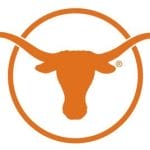 Texas TUFF
Texas TUFF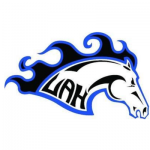 Alabama-Huntsville Nightmares
Alabama-Huntsville Nightmares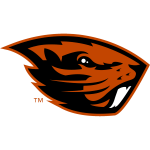 Oregon State Beavers
Oregon State Beavers Georgia Jojah
Georgia Jojah Oregon Ego
Oregon Ego Carleton CUT
Carleton CUT NC State Alpha
NC State Alpha Washington University Contra
Washington University Contra Massachusetts Zoodisc
Massachusetts Zoodisc Pittsburgh En Sabah Nur
Pittsburgh En Sabah Nur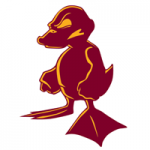 Minnesota Grey Duck
Minnesota Grey Duck California Ursa Major
California Ursa Major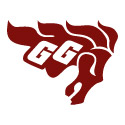 Ottawa Gee-Gees
Ottawa Gee-Gees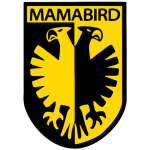
 Cal Poly SLO SLOCORE
Cal Poly SLO SLOCORE Vermont Chill
Vermont Chill Penn State Spank
Penn State Spank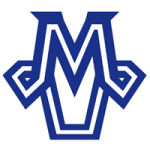 Michigan MagnUM
Michigan MagnUM